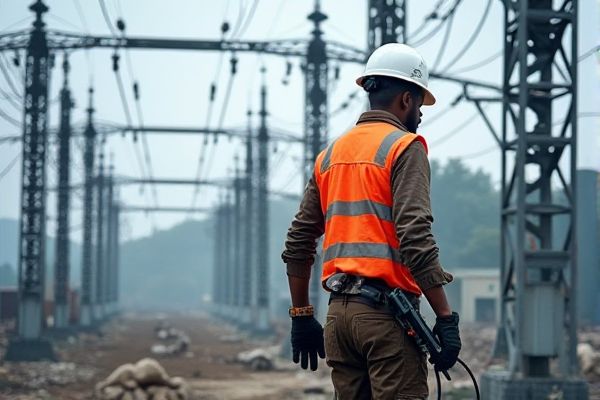
The electrical job market in Nigeria is rapidly growing, driven by increased infrastructure development and investment in the energy sector. Opportunities exist across various fields, including power generation, transmission, and distribution, with roles available for electricians, electrical engineers, and technicians. Employers seek candidates with relevant qualifications, technical skills, and practical experience in electrical systems and renewable energy solutions. Networking and professional certifications can significantly enhance job prospects and career advancement in this dynamic industry.
Job Description
An electrical job in Nigeria typically involves the installation, maintenance, and repair of electrical systems and equipment in residential, commercial, and industrial settings. Technicians must be well-versed in adhering to safety regulations and building codes, ensuring all work is compliant to minimize risks. Your role may also require troubleshooting electrical issues and performing routine inspections to enhance system efficiency and safety. Strong problem-solving skills and knowledge of electrical engineering principles are essential for success in this field.
Requirement
In Nigeria, an electrical job typically requires a solid understanding of electrical principles and regulations. A candidate should possess relevant certifications, such as a degree in electrical engineering or a national technical certificate. Experience in wiring, installation, and maintenance of electrical systems is highly valued. Familiarity with safety standards and energy management practices ensures compliance and enhances job performance.
Salary and Perks Expected
In Nigeria, the salary for electrical jobs varies significantly based on experience, qualifications, and the complexity of the projects undertaken. Entry-level positions may start around 50,000 to 80,000 Naira per month, while experienced electricians can earn between 150,000 and 300,000 Naira or more. In addition to base salaries, perks such as health insurance, overtime pay, and transportation allowances are often included in employment packages, enhancing overall compensation. Understanding these salary trends can help you gauge the potential financial rewards of a career in the electrical field in Nigeria.
Similar Job Names
- Electrical Engineer
- Electrical Technician
- Power Systems Engineer
- Control Systems Engineer
- Electrical Project Manager
- Electrical Design Engineer
- Instrumentation Engineer
- Maintenance Electrician
- Electrical Sales Engineer
- Renewable Energy Consultant
- Substation Engineer
- Electrical Inspector
- Transmission Line Engineer
- Electrical Drafter
- Electrical Safety Engineer
- Electrical Foreman
- Research and Development Engineer
- Electrical Estimator
- Automation Engineer
- Electrical Field Service Technician
Job Expectation Concept
In Nigeria, job expectations for electrical engineers often emphasize a blend of technical expertise and practical problem-solving skills. Familiarity with local electrical codes and standards is crucial, ensuring compliance and safety in various projects. Employers frequently seek candidates who can adapt to the challenges posed by the country's evolving infrastructure and energy landscape. Your ability to engage in continuous learning and stay updated with the latest technologies will enhance your marketability in this competitive field.
Career Advantage and Weakness
The electrical job sector in Nigeria offers significant career advantages, including the increasing demand for skilled professionals as the country invests in infrastructure and energy development. Your opportunities for job stability and growth are enhanced by the government's efforts to improve electricity access, creating numerous positions in both public and private sectors. However, challenges such as inadequate training programs, outdated technology, and limited resources can hinder career advancement in this field. Navigating these weaknesses requires continuous learning and adaptation to emerging technologies to remain competitive.
Important Thing Must Know
Electrical jobs in Nigeria require a solid understanding of local regulations and safety standards, which are essential to protect both workers and clients. Familiarity with the National Electric Code (NEC) and local building codes will help ensure that all installations are compliant and secure. Additionally, obtaining the appropriate certifications can enhance your credibility and open up more job opportunities in the competitive market. Engaging in continuous training and staying updated on emerging technologies is crucial for success in this fast-evolving field. Mastery of energy efficiency practices will also help you advise clients on reducing electricity costs and environmental impact.
Alternative Career Options
Exploring alternative career options in Nigeria for electrical professionals can lead to diverse opportunities in various sectors. One option includes renewable energy, where you could work in solar or wind energy projects, contributing to sustainable solutions. Another path is in the telecommunications industry, focusing on installation and maintenance of communication systems, which is rapidly growing in urban areas. Additionally, roles in teaching or technical consultancy can leverage your expertise, allowing you to share knowledge and train future generations in electrical engineering principles.
Companies List
- Manufacturing companies
- Construction firms
- Telecommunications providers
- Oil and gas companies
- Hospitality industry
- Educational institutions
- Agricultural enterprises
- Power generation companies
- Transportation and logistics firms
- Government agencies
List of Ideal City
Lagos stands out as Nigeria's largest city and a hub for electrical jobs, with numerous industries and companies seeking skilled professionals. Port Harcourt, known for its oil and gas sector, offers diverse opportunities in electrical engineering and maintenance. Abuja, the capital city, features government projects and infrastructure developments that require expertise in electrical work. Enugu, with its growing energy sector, is also a promising location for electrical job seekers looking to advance their careers.
 jobs-nigeria.com
jobs-nigeria.com